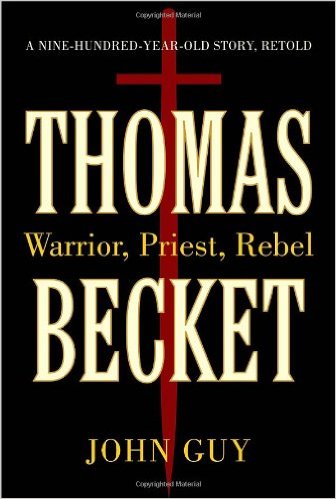 |
| Amazon |
 |
The truly remarkable sequence of events that would allow a middle-class Londoner to rise to a position where he would become the equal of barons and knights, converse regularly with kings and popes, and one day come to defy a king was yet to begin."
That middle-class Londoner was Thomas Becket. This biography lays out that sequence of events from nine centuries ago. As John Guy promises, they truly were remarkable.
After the jump, my review.
Grade: A-
Thomas Becket was not a king. He was not a baron or a knight or a scholar. John Guy calls him a "warrior, priest, rebel" but he really wasn't any of those things, either. He was a middle-class commoner. He was a bureaucrat. He was particularly skilled at government, enough so that King Henry II appointed him his chancellor, then had him chosen as archbishop of Canterbury, even though he wasn't even a priest (he would be ordained a day before he was made bishop). Henry had a purpose in mind. Henry wanted to undermine the independence and power of the Church in England. By placing his own man as archbishop, he had every expectation that the Church would be amenable to his will. That Thomas Becket chose to put service to his Church above his King is the reason history remembers him so many centuries after his murder in Canterbury Cathedral. In an early battle between church and state, Becket stood on principle, opposing the King in a dispute over the power of the King's courts to try clergymen accused of crimes.
John Guy is writing history, not historical fiction. He can't use dramatic license to fill in the blanks. What amazes me is how much we know of Thomas Becket's life. Guy relied on chronicles of Becket's life written within a few years of his death by people who knew him personally. Minutes of royal assemblies at crisis points in Becket's story survive. Hundreds of letters survive, written by Becket to the King of England, the King of France, the Pope, and others. Guy realizes that these sources can't always be taken at face value. Each author had an agenda of their own. Guy does an admirable job of sorting through all the documents and possible motives behind them, letting the reader know his thought process as he weaves an account that he feels best represents the truth.
In John Guy's history, Henry II may be more tyrant than enlightened reformer, but Thomas Becket himself is neither hero nor saint. He's talented, principled, headstrong, and endlessly fascinating, even nine centuries later.

No comments:
Post a Comment